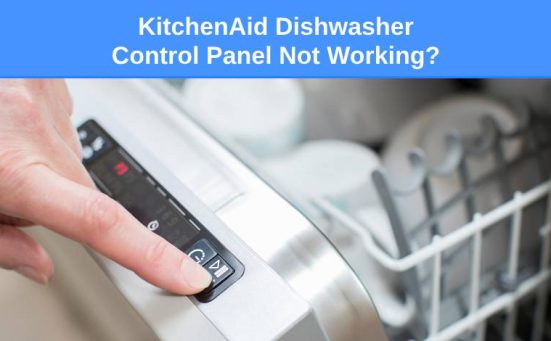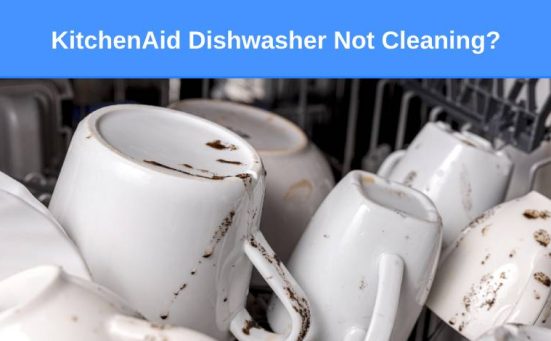
Dishwasher Leaks When Not Running? Here’s why & what to do
If you have recently noticed a leak from your dishwasher it can lead to a serious problem if it isn’t dealt with immediately. Any water leak inside your home could potentially cost thousands of pounds to repair.
That’s way more than the cost of a new appliance, and yet many dishwasher leaks are easy to repair if caught early enough. To find out more keep reading.
In this article we tell you what you should check for all of the most common causes of leaking dishwashers. As well as the best ways to fix that leaky dishwasher yourself.
Why Is The Dishwasher Leaking Even When It’s Not Being Used?
There are several reasons why a dishwasher could be leaking when it’s not running which include;
| Possible Cause | Solution |
|---|---|
| Unlevel Appliance | Check the level using a spirit level and adjust as necessary |
| Damaged Or Defective Door Seal | Inspect and replace the door seal if necessary |
| Defective Door Latch | Inspect and repair/replace the door latch as necessary |
| Using The Wrong Detergent | Ensure you always use the correct dishwasher detergent |
| Using Too Much Rinse Aid | Consult the handbook and only fill the rinse aid reservoir to the required level |
| Blocked Drain Hose | Inspect the drain hose and straighten the hose if twisted and clear any blockages |
| Clogged Filter | Remove and clean the filter |
| Loose Hose Connection | Inspect the hoses and replace or tighten any loose or damaged connectors |
| Clogged Spray Arms | Remove the spray arms, inspect and clean as necessary |
| Defective Water Inlet Valve | Replace the water inlet valve |
| Faulty Float Switch | Inspect and replace the float switch if necessary |
| Defective Pump | Replace the pump |
| Damaged Tub | Contact a technician |
Unlevel Appliance
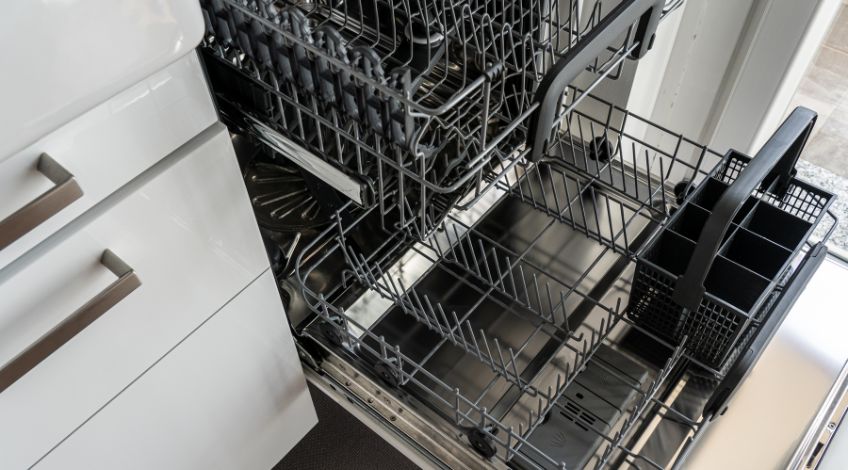
If the dishwasher is set on unlevel ground, or the dishwasher hasn’t been levelled correctly, it could cause water to leak from the appliance. You can check the level using a spirit level.
Check the level front to back and side to side. You can adjust the level using the levelling screws on the front feet of the appliance.
Damaged Or Defective Door Seal
The door of the dishwasher has a rubber seal or gasket which is designed to prevent water from leaking from the dishwasher. Over time, that door seal can become damaged in some way.
It could be due to general wear and tear, get a rip, get food trapped in the rubber somewhere or just become misshapen. Once the door seal becomes damaged, it can allow water to leak from the dishwasher.
The remedy for this could be as simple as repositioning the door seal, giving it a good clean to remove any trapped food particles or other debris. However, if the door seal is severely damaged, it will need to be replaced.
Defective Door Latch
The door latch is designed to keep the door of the dishwasher tightly closed. If the latch is faulty, it could allow some water to seep out through the door.
To solve this you will need to get a new door latch installed. This can be done by a confident DIYer. If you’re not sure of your DIY abilities we recommend getting an expert to do this for you.
SEE ALSO: Dishwasher Door Won’t Close? (here’s why & what to do)
Using The Wrong Detergent
You should always use dishwasher detergent in your dishwasher. Using an incorrect detergent can cause too many soap suds which can cause water and soap to escape through the door of the appliance.
This is a particularly common problem if washing up liquid has been used instead of dishwasher detergent.
If you think this could be the problem, try running the dishwasher using the correct detergent and see if it solves the issue.
Using Too Much Rinse Aid
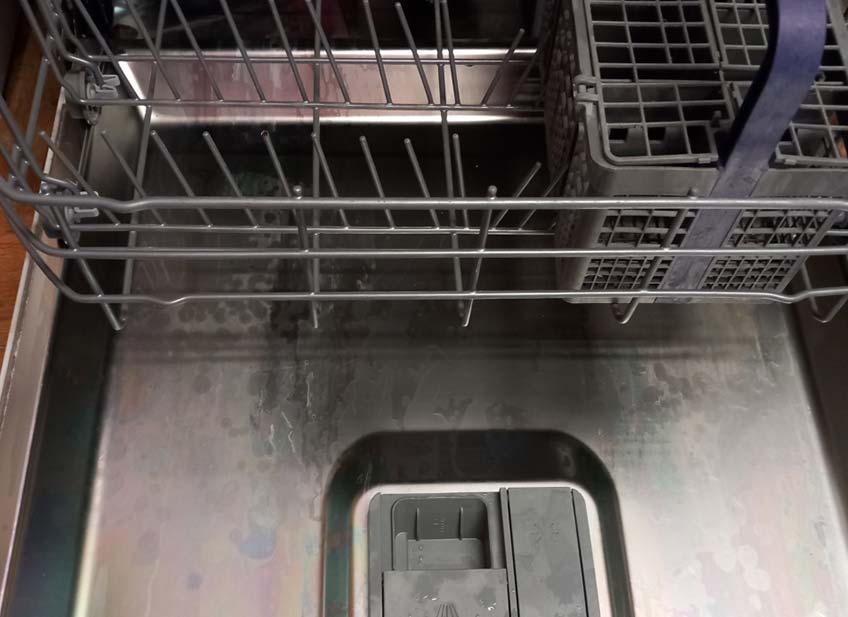
Rinse aid is great for ensuring that your dishes dry properly and that your glassware is sparkling. However, using too much rinse aid can cause too much foam or soap suds which can cause the dishwasher to leak.
You should always consult your user manual for the correct amount of rinse aid needed for your appliance.
Blocked Drain Hose
The drain hose on a dishwasher allows all of the waste water and soap suds to flow out of the appliance to be deposited into the main drain in your home. Over time, the drain hose can become clogged with food particles and other debris washed off the dishes during a regular wash cycle.
This can lead to water backing up into the appliance and leaking out all over the floor. In some cases it could just be that the drain hose has become twisted or kinked and the remedy is as simple as straightening the hose to allow the free flow of waste water again.
If the drain hose isn’t twisted, you may need to remove the drain hose and inspect it for any blockage. You can often clear any blockage by running the hose under a fast running tap.
If this doesn’t work, you could try a plumber’s snake to remove any stubborn blockage.
Clogged Filter
The dishwasher’s filter is designed to trap any food particles or other debris and prevent them from returning to the now cleaned dishes. You will need to remove and clean the filter to remove any food or other debris.
The filter is typically located below the bottom spray arm and to access it you will need to remove the lower rack. The filter should then simply twist and lift from the floor of the appliance.
Once removed, you can wash the filter under a fast running tap or soak it in a vinegar and water 50/50 solution to remove any stubborn grease or fat. Any really stubborn bits can be removed using a toothbrush.
Loose Hose Connection
The dishwasher will have a water inlet hose and a drain hose. If either of these hoses are loose or damaged, they could be the cause of the leak.
To solve this, you will need to inspect the hoses and check for any damage and that the connections are tight and sealed correctly. If there is a problem, you may need to replace the hose or the connector to remove the leak.
Clogged Spray Arms
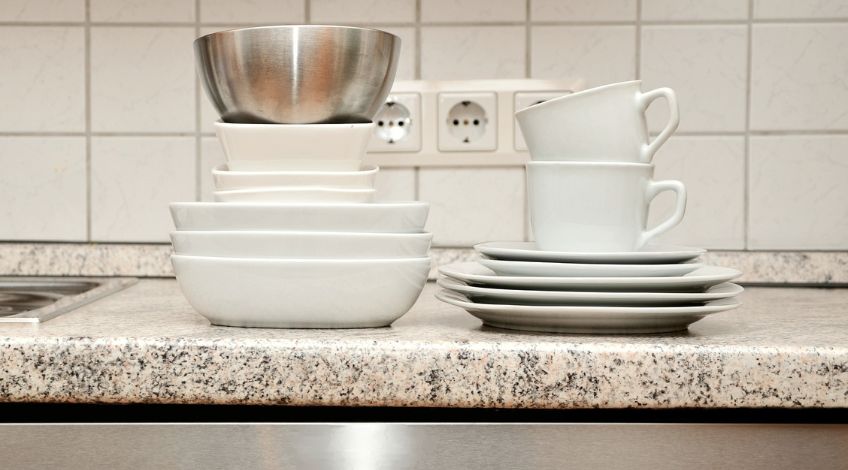
All of the water that touches the dishes in your dishwasher is supplied via the spray arms. If the spray arms become clogged with food particles, limescale or other foreign bodies, it could cause water to leak from the dishwasher even when it’s not being used.
You will need to remove the spray arms to check if there is anything clogging the nozzles. You should clean the spray arms under running water and if you notice anything clogging the nozzles, you can gently prise the blockage out using a toothpick.
Be careful to prise the blockage out of the nozzle and not force it in further.
Defective Water Inlet Valve
All of the water that enters the dishwasher passes through the water inlet valve. The valve regulates the amount of water that enters the appliance at the correct time during the washing and rinsing process.
If the inlet valve becomes damaged or defective, it can leak water from the appliance. You can check and replace the inlet valve yourself, but as it involves dismantling some of the panels on the dishwasher, you might be better leaving this to an expert.
Faulty Float Switch
The float switch detects the amount of water that’s in the dishwasher’s tub at any given time. This allows the appliance to use the correct amount of water to wash and rinse the dishes.
If the float switch becomes faulty, it will not be able to regulate the water level correctly. This will inevitably lead to too much water entering the tub which could lead to the appliance leaking and flooding your home.
If you suspect that the float switch is the cause of the leak in your dishwasher, we recommend getting an expert to investigate this and repair/replace the switch as necessary.
Defective Pump
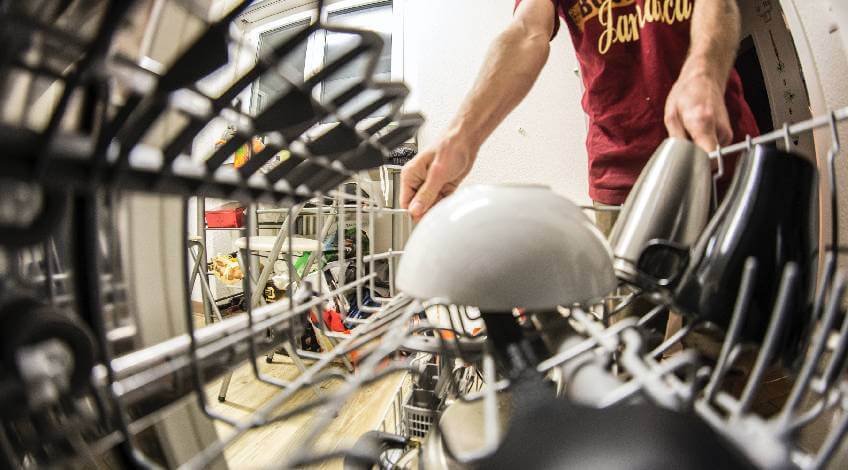
The pump on a dishwasher moves water into and out of the dishwasher. If the pump becomes defective, it could lead to a leak developing in the appliance.
It’s not just the pump itself that can become defective, the pump gasket can become cracked over time which can cause the appliance to leak.
The pump is difficult to access and so we recommend getting an expert to investigate and replace the pump and/or gasket if necessary.
Damaged Tub
The dishwasher’s tub is the main area where the water is held during the washing and rinsing process. If the tub becomes damaged or cracked, it could be the cause of water leaking from the appliance.
If you suspect that the tub is damaged on your dishwasher, you will need expert help in diagnosing and fixing this issue.
Tips On General Dishwasher Maintenance
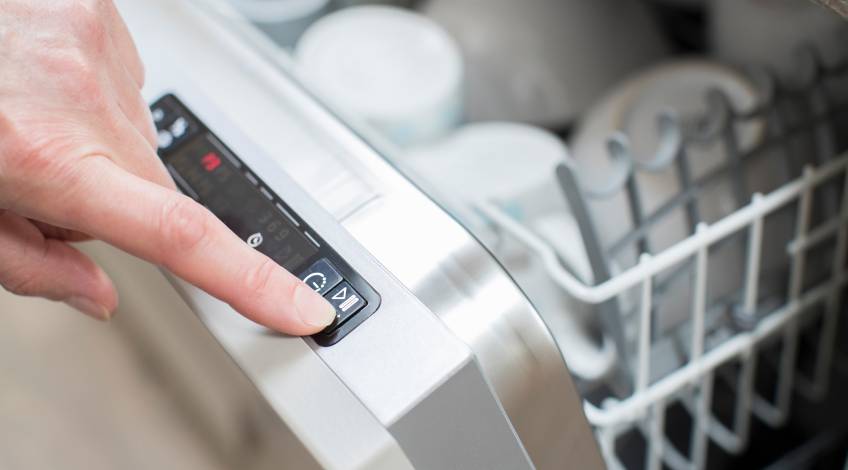
To keep your dishwasher in tip top condition you should;
- Run A Hot Service Wash Once A Month
- Use A Commercial Dishwasher Cleaner Or White Vinegar In The Service Wash
- Inspect & Clean the Door Seal, Spray Arms & Filter Once A Month
- Rinse Dishes Before Loading Them Into The Dishwasher
- Use A Good Quality Dishwasher Detergent
How To Clean A Dishwasher
It is recommended that you clean your dishwasher at least once a month to ensure it keeps working at its best. Cleaning a dishwasher is an easy task and should be done in the following way;
- Remove All Dishes
Ensure all of the racks are empty and free of dishes. - Use White Vinegar To Clean The Dishwasher
Place a bowl half filled with white vinegar on the top rack of the dishwasher. - Run A Hot Wash
Select the hottest wash cycle available on your dishwasher and run the cycle. - Clean The Filter
Once the cycle has finished, remove the filter and clean it under running water, or if it’s really dirty, soak in a white vinegar and water solution. - Clean The Door Seal
Using a soft cloth wipe white vinegar all around the door seal and then rinse using clean water to remove all traces of dirt, debris and vinegar. - Clean The Spray Arms
Remove the spray arms from the dishwasher and clean them using white vinegar. Inspect the nozzles and remove any blockages.
By following these tips, you can help ensure that your dishwasher remains leak free and gives you years of uninterrupted service.
SEE ALSO:
- Dishwasher Salt Alternatives (what you can use instead)
- What Happens If You Put A Dishwasher Tablet In The Washing Machine?
Frequently Asked Questions
If your dishwasher is leaking when it’s not in use it’s most likely because the water inlet valve is faulty or the drain hose is blocked which is preventing the water from draining away correctly.
If there is water at the bottom of your dishwasher when it’s not in use, it’s probably because the drainage system is blocked. This could be the drain hose itself is blocked or the filter is clogged. It could also be because the water inlet valve is faulty.
It is worth fixing a leaking dishwasher as long as the repair will cost less than 50% of the cost of a new appliance and the dishwasher is less than 5 years old. If a new dishwasher will cost you £300 you should not pay more than £150 to get it repaired.

